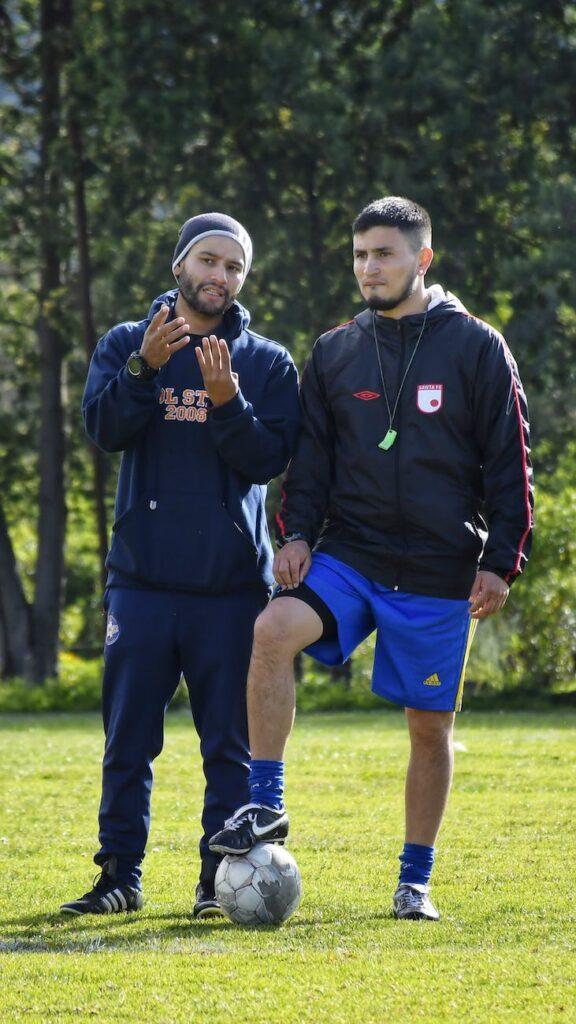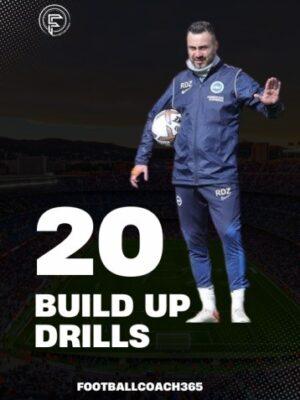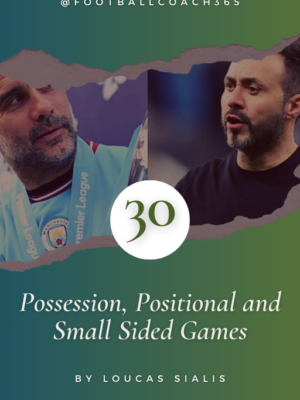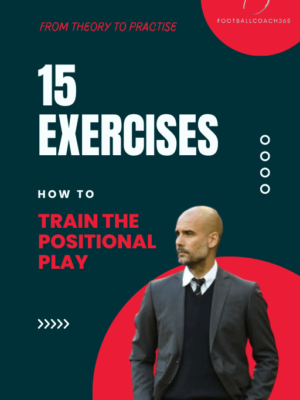In the fast-paced world of football, success isn’t just determined by the talent on the pitch – it starts with the coach. A great football coach shapes players, builds winning teams, and fosters a culture of discipline and improvement. But to lead effectively, coaches must continuously evolve.
That’s where a Coach Personal Development Plan (CPDP) comes in. A structured individual development plan can help football coaches stay ahead of the game, refine their skills, and drive long-term success.
Whether you’re coaching youth, professional teams, or working at the grassroots level, investing in your development as a coach will enhance both your career and your players’ performance. Personal growth is an ongoing process in coaching, filled with challenges that even experienced coaches may find difficult at first.
How do you conduct yourself in environments focused on maximizing individual player performance and talent development? How do you manage experienced or high-profile players? How can you effectively integrate analysis and technology into your weekly training plan? And how can you consistently achieve coaching effectiveness?
Let’s explore how a Coach Personal Development Plan can transform your approach and unlock your full potential on and off the field. Coach education should be of a top priority.
Table of Contents
What is a Personal Development Plan (CPDP)?
A Coach Personal Development Plan is a strategic roadmap designed to improve a coach’s skills, knowledge, and overall effectiveness. It focuses on enhancing technical expertise, leadership abilities, and the ability to adapt to the evolving landscape of football.
A well-rounded CDP typically includes:
- Self-assessment – Reflecting on your strengths and areas that need improvement.
- Goal setting – Establishing clear, measurable objectives to enhance your coaching abilities.
- Action steps – Identifying courses, mentorships, find a personal development coach and gain practical experiences that contribute to growth.
- Performance review – Regular evaluations to track progress and adjust the plan as needed.

Why Do you Need a Coach Personal Development Plan?
Football is a game of strategy, discipline, and constant change. New tactics, player management techniques, and technologies emerge every season. Without a structured development plan, even experienced coaches can become outdated.
A Coach Personal Development Plan ensures that you:
- Stay Relevant – Keep up with the latest football tactics, formations, and training methods.
- Improve Leadership – Learn how to manage teams more effectively and motivate players to perform at their best.
- Enhance Player Development – Equip yourself with the tools to unlock the full potential of each player.
- Increase Career Longevity – Continual growth keeps you competitive, increasing your chances of progressing in your career.
- Gain Respect – Players and clubs respect coaches who invest in their development, fostering trust and loyalty.
The 4 Key Benefits of a CPDP for Coaches
1. Mastering Modern Tactics and Strategies
Football is constantly evolving. New formations, pressing systems, and defensive strategies are introduced regularly. A Coach Personal Development Plan allows you to stay updated with modern trends, ensuring your team remains competitive.
For example, understanding systems like the high press, counter-attacking play, or possession-based football can drastically improve your team’s performance. Through workshops, coaching licenses, and online resources, you can break down tactical innovations used by top managers like Pep Guardiola or Jurgen Klopp and integrate them into your coaching style.
2. Helping the Player Management and Motivation
A coach’s ability to connect with players can determine the success of a team. A Coach Personal Development Plan focuses on developing soft coaching skills like communication, empathy, and leadership – essential tools for managing diverse personalities in the squad.
By improving your emotional intelligence, you can foster a positive team environment, resolve conflicts, and boost morale. This translates to better performances on the pitch and higher player retention rates.
3. Better Training Session Planning
An effective training coaching session is the foundation of player development. A structured Coach Personal Development Plan helps you learn how to design engaging, purposeful training routines that align with your team’s goals.
For instance, if your defense has been conceding goals, your CPDP might include designing defensive drills, set-piece organization, and positioning exercises to improve your team’s tactical approach during training.
4. Career Progression and Opportunities
Whether you aim to coach in higher leagues or lead national teams, a Coach Personal Development Plan empowers the way for career advancement. Earning advanced coaching badges (like UEFA A or Pro Licenses) or attending elite coaching courses can significantly elevate your profile.
Football clubs are more likely to hire or promote coaches who consistently invest in their education and personal growth.
5. Building Stronger Networks in the Football Community
A development plan often involves attending coaching seminars, joining mentorship programs, building a professional cv and digital appearance, or engaging with other professionals in the football world. This expands your network, providing opportunities to learn from experienced coaches and build connections that can lead to job offers or collaborations.
Developing Core Personal Skills
A well-crafted Coach Personal Development Plan (CPDP) includes some personal skills every football coach needs to lead, inspire, and drive success on and off the pitch.
Focusing on these core areas can elevate your coaching and bring the best out of your players.
- Communication – Clear, direct communication is the heartbeat of effective coaching. Whether delivering tactical instructions, providing feedback, or motivating players, your words need to resonate. Strong communication builds trust, minimizes confusion, and ensures your team understands their roles and responsibilities.
- Emotional Intelligence – Football is as much a mental game as it is physical. Understanding your players’ emotions – and managing your own – can foster stronger relationships and improve team morale. By recognizing when a player needs encouragement or discipline, you create an environment that nurtures growth and resilience.
- Problem-solving – Matches rarely go according to plan. The best coaches can think on their feet, adapt strategies mid-game, and find solutions to unexpected challenges. Sharpening this skill allows you to stay composed under pressure and guide your team through difficult situations with confidence.
- Active Listening – Great coaching isn’t just about giving instructions – it’s also about listening. Paying attention to players’ concerns, feedback, and ideas fosters deeper trust and engagement. When players feel heard, they buy into your vision, strengthening the bond between coach and team.
By developing these key skills, you set the foundation for long-term success, creating not just better players, but a stronger, more unified squad.

Creating an Effective Personal Development Plan
- Evaluate Current Skills – Assess your strengths and identify areas needing improvement.
- Set SMART Individual Goals – Focus on specific, measurable, achievable, relevant, and time-bound objectives.
- Seek Feedback – Involve assistant coaches, players, or mentors to provide insights into areas for growth.
- Take Courses and Certifications – Pursue relevant coaching badges, attend seminars, and engage in mentorships.
- Track Progress – Regularly review and adjust your development plan based on results and feedback.
Continuous Learning and Growth
In football coaching, staying stagnant is not an option. The game constantly evolves with new tactics, technologies, and player management techniques. Coaches who seek the continuous learning stay ahead by refining their strategies, developing leadership skills, and adopting innovative training methods.
This ongoing growth ensures they can adapt to new challenges, ultimately driving better team performance and personal career advancement.
- Attending workshops and seminars
- Reading industry publications and books
- Enrolling in online courses or gaining certifications
Best Selling Books
The effect of continuous learning extends beyond the coach. A coach’s growth fosters a culture of development within the team, inspiring players to strive for excellence.
By leading by example and staying informed, you not only elevate your career but also create a positive, high-performance environment where both players and teams thrive.
Overcoming Common Challenges in Personal Development
While personal development is rewarding, it’s not without obstacles. Many football coaches face roadblocks that can slow down their progress. Here’s how to overcome some common challenges:
1. Time Management
Balancing day-to-day coaching responsibilities with personal development can feel overwhelming. The solution? Prioritize learning in small increments. Dedicate just 30 minutes a day to watching tactical analysis videos, reading coaching literature, or reviewing match footage. Small, consistent efforts compound over time.
2. Financial Constraints
Coaching courses and certifications can be expensive. However, many organizations offer scholarships, grants, and online resources. Explore free webinars, coaching podcasts, and community-driven coaching groups that provide valuable insights at little to no cost.
3. Resistance to Change
Some coaches stick to what they know, fearing new methods may disrupt their success. Overcoming this requires a growth mindset – understanding that evolution is part of success. Start by incorporating minor tactical shifts or experimenting with different training exercises. Gradual adaptation can lead to significant breakthroughs.
4. Lack of Motivation
Without immediate results, it’s easy to lose motivation. The key is to set short-term goals that lead to larger objectives. Celebrate small victories, whether it’s successfully implementing a new formation or noticing improved team morale. Progress, even if slow, fuels further growth.
5. Access to Resources
Depending on your location, access to top-tier coaching courses or mentorships might be limited. In this case, exploit online platforms. Websites like England Football learning portal, Coach Corner, SoccerTutor, Coaching Manual, YouTube tactical breakdowns, and virtual coaching summits can provide high-quality education from anywhere in the world.

Learn More on Coach Corner.
Your one stop shop where you can get premium coaching tips, insights, tactics, drills and more that can change your career.
Long-Term Impact of Personal Development
1. Consistent Improvement and Adaptability
Football coaches who engage in continuous development are better prepared to handle challenges and adapt to changing circumstances. Whether facing injuries, dips in form, challenges in managing the team or external pressures, an adaptable assistant or head coach can adjust tactics, maintain morale, and keep the team focused.
Your CPDP equips you with a toolkit of strategies and techniques to address problems creatively, ensuring long-term stability and growth.
2. Higher Team Performance and Achievements
A coach who continually refines their approach naturally translates that growth onto the pitch. Players respond to knowledgeable, forward-thinking coaches, resulting in better performances and improved results.
Over time, this leads to trophies, promotions, and increased recognition – all of which enhance your reputation as a coach.
3. Creating a Lasting Legacy
The most celebrated football coaches leave behind legacies that extend beyond match victories. A CPDP can help you develop youth players, shape future leaders, and implement philosophies that outlast your tenure.
Sir Alex Ferguson, for instance, wasn’t just a master tactician – he was a leader who cultivated a winning mentality that still influences Manchester United today. By investing in your personal growth, you too can build a lasting legacy.

4. Greater Job Security
Football is a results-driven business, but coaches who demonstrate commitment to improvement are often given more time and trust by clubs. A track record of professional development can offer job security, as clubs see the value in retaining coaches who continually bring new ideas and methods to the table.
5. Inspiration for Players and Staff
Players look up to coaches who follow the principles they preach. By actively engaging in development, you set an example for your squad, encouraging players to adopt a growth mindset. This creates a culture of learning within the team, benefiting everyone involved.
Conclusion
A Coach Personal Development Plan isn’t just about becoming a better football coach – it’s about leading teams to success, creating a winning mentality, building a legacy, and shaping future generations. The coaching journey never stops.
By investing in your personal growth, you not only enhance your career prospects but also inspire players to reach new heights.
The best coaches never stop learning – with a structured CDP, you ensure that your coaching career stays on an upward trajectory, unlocking new opportunities and leaving a lasting impact on the game.
FAQs
1. How often should I revisit my personal development plan?
Revisit your PDP every three to six months to ensure you stay on track and adjust as necessary.
2. What’s the most important skill for a coach to develop?
Communication and emotional intelligence are foundational for effective coaching.
3. Can I create a PDP on my own, or should I seek help?
You can create one on your own, but seeking feedback from peers or mentors can add valuable insights.
4. How long does it take to see results from a PDP?
Results vary, but consistent effort often shows noticeable improvement within a few months.
5. What tools can help with personal development tracking?
Use journals, online templates, or apps like Trello and Notion to monitor your progress.



